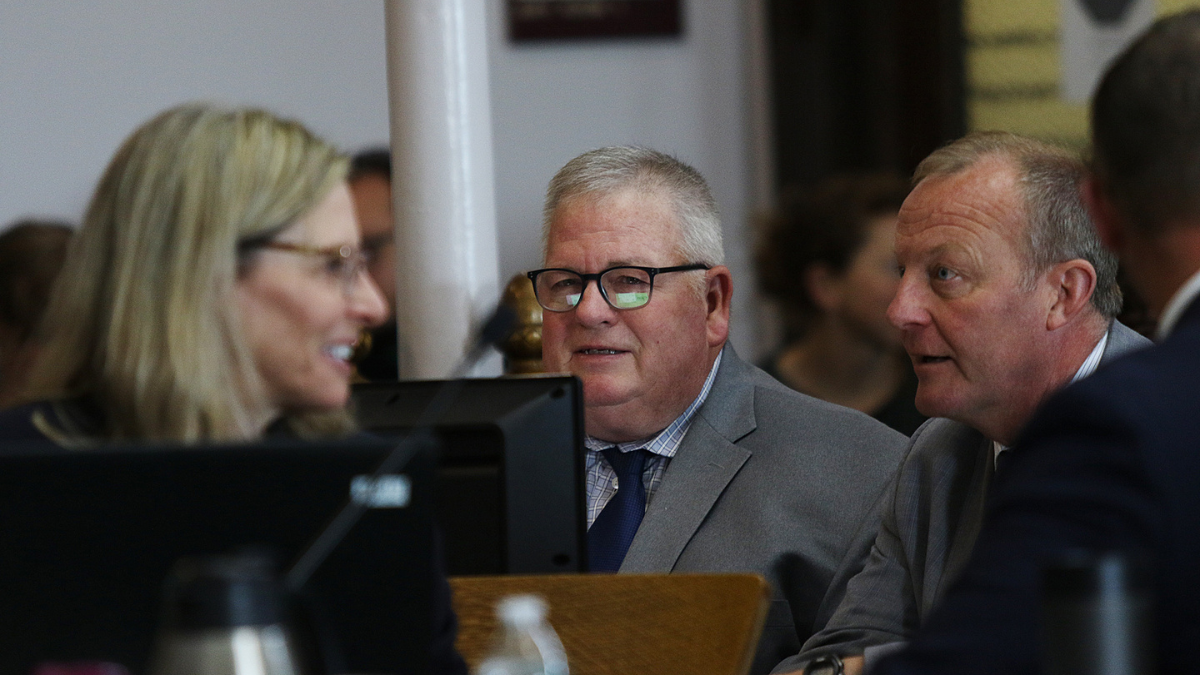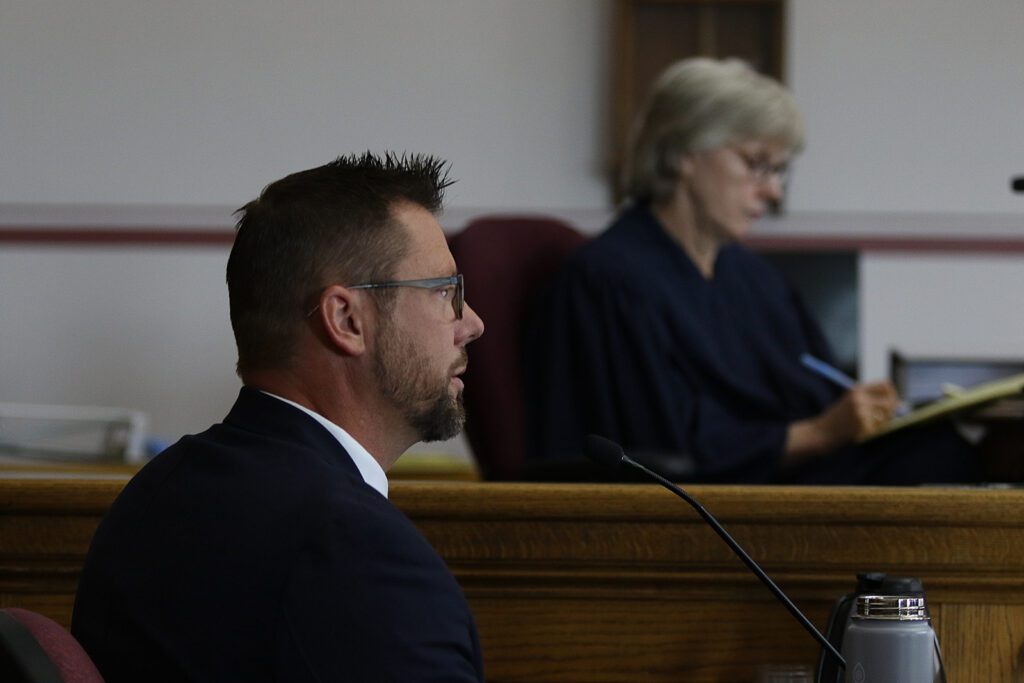Regional News
State employees, economist testify for state as climate trial winds down
Published
1 year agoon
Posted By
Admin
The state called just one expert witness on the penultimate day of the Held v. Montana trial.
By Micah Drew FLATHEAD BEACON
HELENA — Attorneys representing the state of Montana in a constitutional climate lawsuit presented testimony on Monday from two state employees who sought to clarify that the Montana Environmental Policy Act at the heart of the case offers no option for state agencies to regulate greenhouse gas emissions or the impacts of climate change — even if the state loses the lawsuit.
The mission of the Department of Environmental Quality (DEQ) is to “champion a healthy environment for a thriving Montana,” but director Chris Dorrington told the Helena courtroom that the regulatory agency is bound by the laws passed by the Legislature.
“We implement the laws of the state regarding environmental protection,” he said. “We’re not the ones who create the laws.”
Dorrington testified before Lewis and Clark County District Court Judge Kathy Seeley on the sixth day of the Held v. Montana trial, the first time a constitutional climate suit has gone before a judge. Through the lawsuit, 16 youth plaintiffs are seeking to hold the Montana government accountable for its fossil-fuel permitting policies, alleging their right to a “clean and healthful environment” has been violated
At the center of the case is the Montana Environmental Policy Act (MEPA), which established a process for the state to anticipate and prevent “unexamined, unintended, and unwanted consequences,” according to the MEPA handbook, with a provision that major government actions undergo an environmental impact review. In 2011, the Legislature amended MEPA to state that environmental reviews could not consider impacts that are “regional, national or global” in scope — which attorneys for the plaintiffs called the “MEPA limitation” and the “climate change exception” in the initial complaint.
In May, the Legislature amended that provision of MEPA to specifically ban state agencies from considering greenhouse gas emission or climate change impacts within or outside of the state boundaries. Attorneys for the state sought to throw out the Held case based on this rewording of the statute, but in a court order Judge Seeley stated it wasn’t a substantive enough change to disregard the suit.
Dorrington, along with Sonja Nowakowski, DEQ’s Air, Energy and Mining Division administrator, both told the court that MEPA is a procedural statute only and does not provide any authority for the department to make decisions based on potential impacts to the climate.
The department is unable to deny a fossil fuel permit, such as for a coal mine expansion, if the application fully complies with existing law, Dorrington said, and even if Judge Seeley ruled against the state, DEQ would still have no authority to stop permitting coal mining or natural gas operations in the state.
“We will permit what is submitted to us and fully complies with the law,” Dorrington said.


During cross examination, Dorrington contradicted his deposition by saying he did not think the greenhouse gas emissions resulting from DEQ permits have had an effect on the state’s healthful environment.
In addition to serving as a DEQ Division administrator, Nowakowski has a “unique understanding” of environmental policy, having spent years working as a nonpartisan research analyst in the legislative environmental office, which included working on several statewide climate action plans.
During her testimony, she pushed back against insinuations that the department “rubber stamps” fossil fuel permits.
“There isn’t a single person who works at DEQ who doesn’t care deeply about the environment and care deeply about the laws. They’re charged with implementing and enforcing,” she said. “These people thrive on poking holes in applications and making sure that they meet the letter of the law in terms of regulation.”
However, during her cross examination, Nowakowski was repeatedly asked whether DEQ could ever deny a permit of any kind based on greenhouse gas emissions or climate change impacts. She repeatedly stated that under the state permitting regulations — including the Clean Air Act, the Clean Water Act and the Strip and Underground Mine Reclamation Act — DEQ did not have that authority.
She also mentioned that prior to the 2023 MEPA amendment prohibiting a review of greenhouse gas emissions, the word “greenhouse” only appeared in Montana Code Annotated four times — twice for regulation of actual greenhouses and twice for tax abatements for programs promoting renewable energy or limiting greenhouse gases — and that the agency can’t consider something that doesn’t appear in the law.
Attorneys for the plaintiffs returned to several exhibits displayed last week during testimony from Anne Hedges, the co-director of the Montana Environmental Information Center. Those exhibits show that prior to 2011, DEQ routinely conducted analyses of carbon dioxide emissions, establishing that there was a method in place to consider those impacts. Both Dorrington and Nowakowski agreed that such analyses are possible.
While the state lined up several expert witnesses during pre-trial preparation, including having them submit expert reports and depositions, they only called one to the stand, Dr. Terry Anderson.
Controversial climatologist Judith Curry, who watched trial proceedings via Zoom last week and has charged the state of Montana more than $30,000 for her work preparing for the case, according to DeSmog, is no longer testifying. Neither is Dr. Debra Sheppard, a neuropsychologist who during her deposition admitted to not having expertise in how climate change affects children’s mental health.
Instead, the only expert called by state attorneys was Anderson, an economist and senior fellow at the Hoover Institute.
Attorney Thane Johnson took a narrow line of questioning in his direct examination, asking Anderson about the total amount of greenhouse gas emissions from Montana, compared to the global total.
Anderson stated Montana’s 2020 emissions were 0.262 gigatons, just 7/100ths of a percent of the global 34.8 gigatons.
Plaintiffs’ attorney Phil Gregory immediately pushed back on Anderson’s credentials during cross examination, citing numerous errors in Anderson’s expert report, his inability to recall where he pulled the state’s greenhouse gas emissions statistics from, and whether an economist could accurately be considered an expert on greenhouse gas emissions. He also pressed Anderson on his $500 per hour rate to provide expert testimony, a task to which Anderson said he’d devoted at least 25 hours. By contrast, the experts for the plaintiffs all stated they were appearing without compensation.
Gregory was unsuccessful in his attempts to strike Anderson’s testimony from the record, although Seeley admitted it “raised some questions.”
The trial was expected to last for a full two weeks, but counsel for both sides told Seeley they are prepared to deliver closing remarks — not to exceed 10 minutes — on Tuesday morning.
Following the day’s proceedings, attorneys with Our Children’s Trust, one of the firms representing the plaintiffs, told reporters that with the “irrefutable evidence” provided to the court, they expect to win the case.
This article is part of a series on the youth-led constitutional climate change lawsuit Held v. Montana, which went to trial in Helena on June 12. The rest of the series can be read at mtclimatecase.flatheadbeacon.com. This project is produced by the Flathead Beacon newsroom, in collaboration with Montana Free Press, and is supported by the MIT Environmental Solutions Journalism Fellowship.
Upcoming Events
november, 2024
Event Type :
All
All
Arts
Education
Music
Other
Sports
Event Details
Spanish Classes with World Language InitiativeThese unique, no cost Spanish classes are made possible by the contribution of Yellowstone Club
more
Event Details
Spanish Classes with World Language InitiativeThese unique, no cost Spanish classes are made possible by the contribution of Yellowstone Club Community Foundation (YCCF) and Moonlight Community Foundation (MCF). This class will focus on building a lifelong affinity for world languages and cultures through dynamic and immersive Communicative Language teaching models.
Beginner Class – Mondays and Wednesdays from 5:30-6:30 pm
Intermediate Class – Mondays and Wednesdays from 6:45- 7:45 pm
- Classes begin Oct.7, 2024 and run for 6 weeks
- Class size is limited to 12 students
- Classes are held in Big Sky at the Big Sky Medical Center in the Community Room
For more information or to register follow the link below or at info@wlimt.org.
Time
October 28 (Monday) 5:30 pm - December 4 (Wednesday) 7:45 pm
Location
Big Sky Medical Center - Community Room (2nd Floor)
Big Sky Medical Center - Community Room (2nd Floor)
Event Details
Spanish Classes with World Language InitiativeThese unique, no cost Spanish classes are made possible by the contribution of Yellowstone Club
more
Event Details
Spanish Classes with World Language InitiativeThese unique, no cost Spanish classes are made possible by the contribution of Yellowstone Club Community Foundation (YCCF) and Moonlight Community Foundation (MCF). This class will focus on building a lifelong affinity for world languages and cultures through dynamic and immersive Communicative Language teaching models.
Beginner Class – Mondays and Wednesdays from 5:30-6:30 pm
Intermediate Class – Mondays and Wednesdays from 6:45- 7:45 pm
- Classes begin Oct.7, 2024 and run for 6 weeks
- Class size is limited to 12 students
- Classes are held in Big Sky at the Big Sky Medical Center in the Community Room
For more information or to register follow the link below or at info@wlimt.org.
Time
November 4 (Monday) 5:30 pm - December 11 (Wednesday) 7:45 pm
Location
Big Sky Medical Center - Community Room (2nd Floor)
Big Sky Medical Center - Community Room (2nd Floor)
Event Details
Spanish Classes with World Language InitiativeThese unique, no cost Spanish classes are made possible by the contribution of Yellowstone Club
more
Event Details
Spanish Classes with World Language InitiativeThese unique, no cost Spanish classes are made possible by the contribution of Yellowstone Club Community Foundation (YCCF) and Moonlight Community Foundation (MCF). This class will focus on building a lifelong affinity for world languages and cultures through dynamic and immersive Communicative Language teaching models.
Beginner Class – Mondays and Wednesdays from 5:30-6:30 pm
Intermediate Class – Mondays and Wednesdays from 6:45- 7:45 pm
- Classes begin Oct.7, 2024 and run for 6 weeks
- Class size is limited to 12 students
- Classes are held in Big Sky at the Big Sky Medical Center in the Community Room
For more information or to register follow the link below or at info@wlimt.org.
Time
November 11 (Monday) 5:30 pm - December 18 (Wednesday) 7:45 pm
Location
Big Sky Medical Center - Community Room (2nd Floor)
Big Sky Medical Center - Community Room (2nd Floor)
Event Details
Spanish Classes with World Language InitiativeThese unique, no cost Spanish classes are made possible by the contribution of Yellowstone Club
more
Event Details
Spanish Classes with World Language InitiativeThese unique, no cost Spanish classes are made possible by the contribution of Yellowstone Club Community Foundation (YCCF) and Moonlight Community Foundation (MCF). This class will focus on building a lifelong affinity for world languages and cultures through dynamic and immersive Communicative Language teaching models.
Beginner Class – Mondays and Wednesdays from 5:30-6:30 pm
Intermediate Class – Mondays and Wednesdays from 6:45- 7:45 pm
- Classes begin Oct.7, 2024 and run for 6 weeks
- Class size is limited to 12 students
- Classes are held in Big Sky at the Big Sky Medical Center in the Community Room
For more information or to register follow the link below or at info@wlimt.org.
Time
November 18 (Monday) 5:30 pm - December 25 (Wednesday) 7:45 pm
Location
Big Sky Medical Center - Community Room (2nd Floor)
Big Sky Medical Center - Community Room (2nd Floor)










